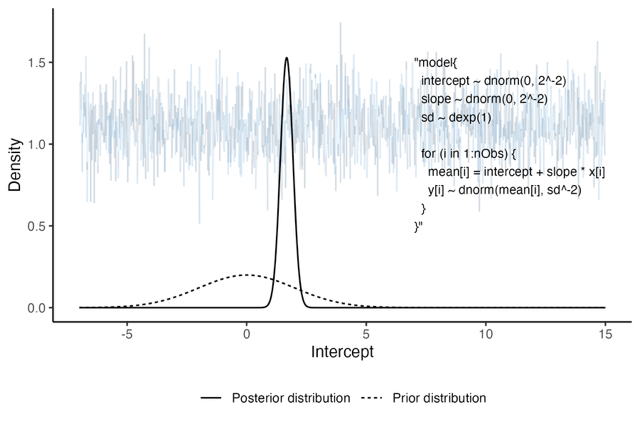An Introduction to Coding Bayesian Models
- Start Date: May 14, 2025
- End Date: July 02, 2025
- Time: 9am-11am Pacific
- City: Online
- Venue: Zoom
- Instructor: Nicole Hill
- The course is delivered via 2-hour online sessions on Wednesday mornings, plus a 1-hour private session.
Registration full. Email [email protected] to be put on waitlist.
Course Description
 This is an eight-week online course for people who are looking for a practical introduction to fitting Bayesian ecological models in JAGS. The course will cover the following topics: preparing data for JAGS, specifying prior distributions, coding models in the JAGS dialect of the BUGS language, providing initial values, getting MCMC samples, evaluating convergence, summarizing posterior distributions, model validation, and common errors and pitfalls.
This is an eight-week online course for people who are looking for a practical introduction to fitting Bayesian ecological models in JAGS. The course will cover the following topics: preparing data for JAGS, specifying prior distributions, coding models in the JAGS dialect of the BUGS language, providing initial values, getting MCMC samples, evaluating convergence, summarizing posterior distributions, model validation, and common errors and pitfalls.
Each week, students can expect a shorter theoretical portion and longer practical portion. We will start with basic intercept-only models, and slowly add complexity with fixed and random effects. The models covered will include:
- A simple linear regression model
- Fitting models to count data with Poisson and binomial GLMs
- Fitting models to binary data with Bernoulli GLMs
Each week, students will be expected to spend approximately one hour of additional time on a short exercise intended to deepen their understanding of the material. The instructor will also offer a 1-hour priviate session for each student registered in the course.
Student webpage is here. Password will be provided to all registrants on the first day of the course.
What is included in this course?
Students will be provided with access to an online book summarizing the material covered. The course will also include a one-hour private session to address each student’s own data and/or modelling questions.
The course will be recorded and students will have access to these recordings until one month after the course concludes.
Prerequisite knowledge
- Good working knowledge of R, including the following:
- Able to read in, clean, and plot data
- Understand how for loops work
- Understand numeric, integer, and factor classes of data
- Have at least one statistics course and practical experience fitting models, including generalized linear (mixed) models.
Our Instructor
Nicole Hill works for Poisson Consulting Ltd. as a computational biologist, where she has hand-coded over 30 Bayesian models in JAGS and Stan to help clients answer questions about their data. She specializes in population dynamics and abundance estimation, and actively maintains several R packages on GitHub.
Nicole’s strong interest in quantitative ecology began during her undergraduate studies at Simon Fraser University, when she began coding in R. She went on to pursue a Master’s degree in Statistical Ecology from the University of St Andrews, where her dissertation focused on modifying the likelihood for distance sampling to accommodate a unique survey design. Nicole is passionate about sharing knowledge and empowering others to navigate the complexities of statistical modelling.
Preparation and what to bring
- Computer with reliable internet connection, and equip with video camera and a speaker/mic adequate enough to clearly communicate via the Zoom video conferencing platform.
- A free account with Posit Cloud
- Zoom. More info on system requirements for Zoom can be found here.
Registration
Registration includes free access to the cloud version of Posit (RStudio), the course workbook, and course recordings for one month after the course concludes.
Member: $535*
Non-member: 580
Class size limited to 16 people, register immediately to secure your spot.
*Memberships may be purchased/renewed while you register. More about membership here.
Registration now full
Note: When registration fills you may request to be placed on the notification list should an extra seat open up in the course, and/or to be notified of the next time we offer this course. To join this list, please email Hailey: office@cmiae.org
Thank you!
 This course is offered in partnership with the team at Poisson Consulting.
This course is offered in partnership with the team at Poisson Consulting.

